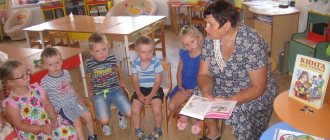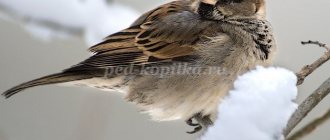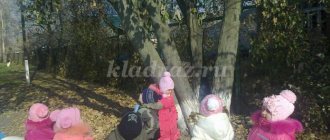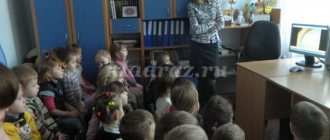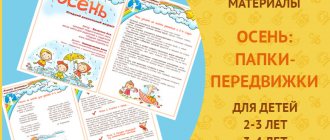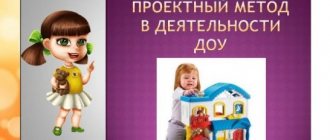Book week in kindergarten. Project for senior group
Passport of the pedagogical project: Project “Book Week”
Project: “Journey through Book Week with a stop at the Biblioteka station, for older children
Author: Efimova Alla Ivanovna, teacher of GBDOU No. 43, Kolpino St. Petersburg Description: The material will be useful and interesting for educators, junior and additional teachers education, parents, senior educators. Goal: Fostering love and respect for books. Forming children's interest in children's books through creative and cognitive activities. Objectives: - To introduce children to the types and purposes of books. — Clarify the role of writers, illustrators and designers. — Teach children to create a book with their own hands. — Develop creativity, imagination, fantasy. — Create conditions for the development of children’s creative abilities. — To form in children an idea of the role of books in human life. — Introduce children to different genres of books. — Give children knowledge about the role of the library. — Foster love and respect for books. - Encourage children to write. — Activate children’s speech, enrich and expand their vocabulary. — Involve parents in creative activities with their children. — Replenish the development environment with creative games “Library”, “Bookstore”.
Project “Book Week” Project type : short-term, Implementation period: 2 weeks. The presence of interdisciplinary connections: integration of educational areas - cognitive development, speech development, social and communicative development, artistic and aesthetic development, physical development. Type of project: artistic - creative. Project participants: teachers, older children, parents. Material and technical resources necessary to complete the project: - selection of methodological and fiction literature; - selection of visual material (illustrations, posters, photographs, books - encyclopedias; primers; alphabet books; fairy tales); — didactic games; - selection of cartoons; presentations on the topic; — an exhibition of books, drawings, an exhibition of creative works of parents and children. Necessary conditions for the implementation of the project: - interest of parents and children; — methodological developments. Relevance of this project. Recently, interest in the book has decreased significantly throughout the world. Books are increasingly being replaced by computers, electronic and digital media. Books become unclaimed, gather dust on shelves, and sit idle in libraries and stores. The book gradually fades into the background, reading ceases to be a process of educating one’s own soul, requiring a lot of work of the mind and heart, experience, and comprehension from a person. A reading person is a thinking person. This is why it is so important to instill in children a love of books starting from preschool age. Reading experience begins to develop in childhood. This is the age at which the ability to perceive a work of art with hearing, vision, touch, and imagination most clearly appears; sincerely, from the heart, to sympathize, to be indignant, to rejoice. With this project I would like to help parents and children find books that will help them acquire the joy of communication. Project methods: - gaming: didactic games; Board games; outdoor games; games - dramatization; plot-role-playing games; - verbal: reading and telling poems, fairy tales, riddles; conversation, conversation; looking at pictures; looking at books; encyclopedias; - practical: exercises (providing assistance), joint actions of the teacher and the child, - visual: showing presentations, using illustrations, paintings, photographs, showing cartoons; thematic exhibition. Three Question Method: What do we know? We know that there are books. We know that they are different. What do we want to know? How did the book come about? Where are the books kept? What kind of books are there? What is a library? And much, much more... Where and how will we find answers to our questions? Going to the library; Let's ask the adults for the answer; Let's read literature. Tasks for working with parents: - Enrich parents’ knowledge about the role of reading on the development of thought processes and creative abilities. — Increase the competence of parents on the topic of the project week. — Involve families to participate in the educational process on the basis of pedagogical cooperation. Expected result: - exhibition of children's works (modeling, appliqué, drawing, crafts...); - joint work of parents and children; - speech creativity of children; — didactic games and manuals; - GCD; - game - dramatization of children; - game - dramatization of parents. - name your favorite works; - can retell short texts, compose fairy tales, read poems expressively, and stage dramas independently; - know how to properly and carefully handle books: repair them, use bookmarks. - children learned about the importance of books in human life; - understand the concept of “Library”; - they know that they need to take care of the book; - know how to make their own books. Stages of the project: Before the “Book Week”, a developmental environment was created in the group. Exhibitions of books were organized on the following topics: “Smart Books”, “Little Books”, “Fairy Tales”, “My Favorite Book”, and a conversation was held about the upcoming holiday.
Children and parents were given homework: - reread their favorite books, - make illustrations for the fairy tale “Flower - Seven Flowers”. Collaborative work between children and parents. Stage 1 – preparatory (term 03/19/2015 – 04/03/2015). Setting goals and objectives, determining directions, objects and methods, preliminary work with children and parents, choosing equipment and materials. Survey of children “My favorite book”, survey of parents “Introducing a child to fiction”, identification of the problem. Processing the information received, selecting visual and gaming material. Studying methodological literature, developing a plan for joint activities. Objectives: - determine children’s current knowledge about books; - arouse interest in solving the problem. Forms of organizing work at stage 1: - planning project activities on the topic “Books. Library" based on methodological literature; — selection of methodological and fiction literature; - selection of didactic, mobile, sedentary; — drawing up a plan for interaction with parents and children. Stage 2 – practical. Finding answers to the questions posed in different ways, through the practical activities of children. Implementation of a plan of joint activities through the integration of different types of children's activities. Tasks: - creating a problem situation; - develop expressive speech; — develop cognitive abilities in children in the process of joint theatrical activities; — fill a corner of the book with materials on the topic of the project; - cultivate accuracy when working with a book. Forms of organization of work stage 2: - Work with children (organization of educational activities, organization of motor mode) Forms of work with children. Thematic conversations: - Situational conversation: “Do I need to take care of the book?” — Conversation: “What does a book consist of?” — Conversation on the topic “What is a library?”; — Conversation “The book is our friend.” — Conversation “I want to know everything!” - Conversation “HISTORY OF THE BOOK” (Teacher’s story about the development of writing with illustrations shown - clay tablets, scrolls, papyrus, parchment, birch bark, handwritten books, early printers, printing press). — Emotional speech warm-up “PROBERDS.” (Children pronounce proverbs about books with different intonations: cheerful, questioning, surprised, affirmative). — Acquaintance with the work of K.I. Chukovsky. — Examination of illustrations to the works of K.I. Chukovsky. — Display of the quiz presentation “Guess the Fairy Tale.” — Poll of children: “My favorite book.” Making a homemade book theme: “Spring is coming, spring is making way”; “Flower - seven-flowered” Introduction to proverbs: A spoken word will be forgotten, but a word written in a book will be remembered. From time immemorial, a book has raised a person. He who reads knows a lot Reading fiction: Reading the poem “Doctor Aibolit” using sound effects. "Fly Tsokotukha". "Flower - seven flowers." Russian folk tales, poems, stories, studied poems, encyclopedias. Watching the cartoon “Lessons from Aunt Owl. Baby's ABC" Listening to fairy-tale-themed songs. Artistically productive activities: - Making invitation cards for the fairy tale: “Teremok in a new way”;
— modeling “My favorite fairy tale hero”; — application “Bookmark for books”;
— drawing “My favorite book characters”; — drawing “Cover of your favorite book.” Theatrical activity: Game – dramatization “Tsapping fly”
Intellectual quiz game “Journey to the land of fairy tales” Consultations for parents: “How to teach a child to love books”, “Reading aloud to a child”, “So that a child loves to read. Advice from psychologist V.S. Yurkevich,” Questioning: “What books do they read at home.” Questioning: “Introducing a child to fiction”, Selection of children's works: - “Teremok”; - "Fly Tsokotukha"; - “Flower - seven-flowered.” Didactic games: “Collect a fairy tale”, “Finish the sentence”, “Say a word”. “Tell your favorite fairy tale”, cut-out pictures, puzzles “My favorite fairy tales”, “How to behave with a sick person?”; Fold the picture” game “Which fairy tale is the hero from?”; Design of the exhibition of children's encyclopedias "The smartest books" Role-playing games: "Library", "Bookstore" Construction using mathematical sets: "Assembling a bookshelf, cabinet"; from the constructor: “Building a library.” Outdoor games: “Confusion.” "Who is faster". “Find and remain silent.” “We are funny guys”; Repair of “sick” books in the book corner “Knizhkina Hospital” Travel through the exhibition “Magic Tales” - examination of books that differ in content, design, focus. Stage 3 – generalizing (final). Summarizing the results of work in a game form, analyzing them, consolidating the acquired knowledge, formulating conclusions. The best works of children, photographic materials and the final event for the project week will be included in the work experience. Exit to the library. Objectives: - develop creative abilities; -develop interest in reading books; — develop the ability to analyze, generalize and draw simple conclusions; - develop observation and curiosity, cognitive activity - cultivate independence in various types of activities. During the implementation of the Book Week project, the expected results were achieved: - As a result of the project, children became acquainted with the works of children's writers. — Children learned to recognize writers and poets in reproductions and photographs. — The children met children’s book illustrators. — Thematic exhibitions were organized for children. — The children learned how to repair books. — The children created creative works based on the works they read. — The children watched performances based on the works they had read. — Parents of pupils got acquainted with information on nurturing a love of reading. — We made a trip to the library.
Project prospects: In the future we plan to continue the work we started.
We recommend watching:
Project in kindergarten for older preschoolers 5-7 years old on legal topics Project in the senior group of kindergarten Project in the senior group on the topic “Trees and shrubs in spring” Project in the senior and preparatory group of the kindergarten
Similar articles:
Project for children of the senior group “Our cheerful garden”
Project of the preparatory group within the framework of “Book Week”
Project "Book Week"
Project passport:
Project type:
According to the dominant activity in the project: informational, creative.
According to the number of project participants: group (21 children, group teachers, everyone).
By duration: short-term (1 week).
By the nature of contacts: family, within the preschool educational institution, society - library, Drama Theater, Ivanovo Philharmonic.
According to the profile of knowledge: interdisciplinary (in sections of the educational program “Childhood” (St. Petersburg).
By type of design object: social.
According to the nature of the child’s participation in the project: a participant from the inception of the idea to the receipt of the result.
Composition of the project team:
project manager, teachers - Lebedeva Olga Aleksandrovna, Feklina Irina Gennadievna and a group of senior preschool age.
Objective of the project:
Cultivating a correct attitude towards a book as an object of gaining knowledge and pleasure. Formation of ideas about the moral meaning of literary works.
Project objectives:
- To lead to a motivational assessment of the actions and characters of the characters in books.
- To consolidate knowledge about the genre features of books.
- Activating children's creative thinking.
- Expand opportunities for cooperation with the library, intensify visits to the library.
- Introduce children to the works of children's writers and poets.
- To introduce children to the unique creative style of children's book illustrators.
This project is significant for all project participants:
- Children develop skills of independence and active interaction with books. Moral ideas about the content of works by children's authors are expanding.
- Teachers continue to master the design method - a method of organizing rich children's activities, which makes it possible to expand the educational space, give it new forms, and effectively develop the creative and cognitive thinking of a preschooler.
- Parents expand the possibilities of cooperation with their children and listen to their opinions.
Estimated distribution of roles in the project team.
Educator -
organizes educational activities on the works of children's authors, design of a photo exhibition based on the results of the project, and placement of the project on the kindergarten website.
Children
- participate in cognitive activities, create creative works.
Parents
together with children - look for works, read, make crafts with their own hands.
Providing project activities:
Material and technical:
Audio recordings, cartoons, books, illustrations, games and toys, creative material.
Diagnostic - didactic:
Summaries of continuous educational activities.
Expected result
External Products:
1. Exhibition of creative works of children (drawings, crafts, baby books, restored books)
2. Replenishment of the group library.
3. Exhibitions.
Domestic Products:
Children learned to give a motivational assessment of the actions of book characters and understand the genre features of books. The amount of memorized literary material has increased.
Demonstrating a need to visit the library.
Stages of work on the project
- Determining the theme of the project.
- Formulation of goals and objectives.
- Drawing up a project plan.
- Project implementation.
- Summing up the project.
Educational work within the framework of the “Book Week” project
| Days of the week | Educational area | Direct educational activities | Tasks | Responsible |
| Day 1 of the April Fools' Day | Cognition Communication Socialization Reading fiction Artistic creativity | 1.NOD “Humor in poems and fairy tales” (introduction to fiction) 2. GCD “Who made the book?” (social world) 3. NOD “Visiting Literary Heroes” (N. Nosov “Bobik Visiting Barbos”) (physical education) | — Initiate children’s search for expressive means to express joy; - arouse interest in books of various genres; - develop a sense of pride that the child can read books; — continue to work on the formation of a moral sense; — continue to introduce children to new works | Teachers: Lebedev O.A. Feklina I.G. |
| Day 2 of the project | Cognition Communication Socialization Reading fiction Artistic creativity Theatrical activities | 1. GCD “Which fairy tale is the episode from?” (examination of illustrations from fairy tales by A.S. Pushkin, familiarization with fiction) 2. GCD “Draw a fairy-tale character and we will guess the fairy tale” (visual activity) 3. GCD Costume skit “The Tale of Tsar Saltan” (theater + play) 4. GCD Game n/a “Collect a picture” | -Introduce poets and their works - arouse interest in books of various genres; - develop a sense of pride that the child can read books; — continue to work on the formation of a moral sense; | Teachers: Lebedeva O.A. Feklina I.G. |
| Day 3 of the project | Cognition Communication Socialization Reading fiction Artistic creativity | 1. GCD Quiz “Dear fairy tales by K. Chukovsky” (introduction to fiction) 2. GCD Didactic games “Who is who”?, “Guess the riddles”, “Remember the fairy tale from the passage”. 3. GCD “Caring for the hands brings joy to the heart” “Through the pages of your favorite fairy tales” (Modeling) 4. GCD Detective Quiz: Creative game “Verbal Portrait”, Story game “Investigative Inquiry”. | — Introduce poets and their works - arouse interest in books of various genres; - develop a sense of pride that the child can read books; — continue to work on the formation of a moral sense; | Teachers Lebedeva O.A. Feklina I.G. |
| Day 4 of the project | Cognition Communication Socialization Reading fiction Artistic creativity | 1. GCD “Visiting a fairy tale” (mathematics) 2. NOD “Knizhkina Hospital” (selection of material for the treatment of “sick” books, repair of books) 3. “Cat Dreams” - poems for children by Svetalna Dream, a hobby with creativity. Speech by a librarian. 4. Crossword “Heroes of fairy tales” | — Introduce poets and their works - arouse interest in books of various genres; - develop a sense of pride that the child can read books; — continue to work on the formation of a moral sense; | Teachers Lebedeva O.A.. Feklina I.G. |
| Day 5 of the project | Cognition Communication Socialization Reading fiction Artistic creativity | 1. GCD Fairy tale “The Ugly Duckling” by G.Kh. Andersen (speech development). 2. GCD Performance “Thumbelina” (theater + game) 3. GCD Creative game “Fairytale dossier” 4. GCD “Caring for the hands brings joy to the heart.” Fairy tale “Wild Swans” (applique) | — Introduce poets and their works - arouse interest in books of various genres; - develop a sense of pride that the child can read books; — continue to work on the formation of a moral sense; | Teachers Lebedeva O.A. Feklina I.G. |
Project result:
1. As a result of the joint activities of pupils and teachers of preschool educational institutions, children became familiar with highly artistic literature and theatrical activities, broadened their horizons about children's books, their authors, characters, formed a stock of literary impressions, learned to illustrate, dramatize literary works, and make books with their own hands. The children got acquainted with the work of illustrators.
2. Parents of students received information on how to foster a love of reading in their child.
3. The project method developed cognitive interest in various areas of knowledge in children and formed cooperation skills.
Knizhkina Hospital
Children repair books
Crafts on the theme Heroes of our favorite fairy tales
Creating a group library
Creativity based on works by children's authors
Board games based on works by children's authors
Children's crafts based on what they read
New books in the ecological corner
Polina Delectorskaya repairs books
A.S. Day Pushkin
Books repaired by children
Book repair
